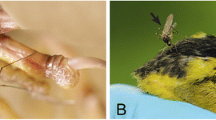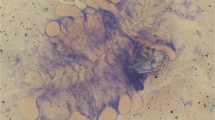Abstract
The competence of insect vectors to transmit diseases plays a key role in host-parasite interactions and in the dynamics of avian malaria and other haemosporidian infections (Apicomplexa, Haemosporida). However, the presence of parasite DNA in the body of blood-sucking insects does not always constitute evidence for their competence as vectors. In this study, we investigate the susceptibility of wild-caught mosquitoes (Culex spp.) to complete sporogony of Plasmodium relictum (cyt b lineage SGS1) isolated from great tits (Parus major L., 1758). Adult female mosquitoes were collected with a CO2 bait trap overnight. A set of 50 mosquitoes was allowed to feed for 3 h at night on a single great tit infected with P. relictum. This trial was repeated on 6 different birds. The bloodfed mosquitoes that survived (n = 68) were dissected within 1–2 days (for ookinetes, n = 10) and 10–33 days post infection (for oocysts and sporozoites, n = 58) in order to confirm the respective parasite stages in their organs. The experiment confirmed the successful development of P. relictum (cyt b lineage SGS1) to the stage of sporozoites in Culex pipiens L., 1758 (n = 27) and in Culex modestus (n = 2). Our study provides the first evidence that C. modestus is a competent vector of P. relictum isolated from great tits, suggesting that this mosquito species could also play a role in the natural transmission of avian malaria.


Similar content being viewed by others
References
Atkinson CT, Saili KS, Utzurrum RB, Jarvi SI (2013) Experimental evidence for evolved tolerance to avian malaria in a wild population of low elevation Hawai’i ’Amakihi (Hemignathus virens). Ecohealth 10:366–375. https://doi.org/10.1007/s10393-013-0899-2
Balenghien T, Vazeille M, Reiter P, Schaffner F, Zeller H, Bicout DJ (2007) Evidence of laboratory vector competence of Culex modestus for West Nile virus. J Am Mosq Control Assoc 23:233–236. https://doi.org/10.2987/8756-971X(2007)23[233:EOLVCO]2.0.CO;2
Bensch S, Hellgren O, Pérez-Tris J (2009) MalAvi: a public database of malaria parasites and related haemosporidians in avian hosts based on mitochondrial cytochrome b lineages. Mol Ecol Resour 9:1353–1358. https://doi.org/10.1111/j.1755-0998.2009.02692.x
Ferraguti M, Martínez-de la Puente J, Muñoz J, Roiz D, Ruiz S, Soriguer R, Figuerola J (2013) Avian Plasmodium in Culex and Ochlerotatus mosquitoes from southern Spain: effects of season and host-feeding source on parasite dynamics. PLoS One 8:e66237. https://doi.org/10.1371/journal.pone.0066237
Ferraguti M, Martínez-De La Puente J, Roiz D, Ruiz S, Soriguer R, Figuerola J (2016) Effects of landscape anthropization on mosquito community composition and abundance. Sci Rep 6:1–9. https://doi.org/10.1038/srep29002
Folmer O, Black M, Hoeh W, Lutz R, Vrijenhoek R (1994) DNA primers for amplification of mitochondrial cytochrome c oxidase subunit I from diverse metazoan invertebrates. Mol Mar Biol Biotechnol 3:294–299
Guimarães L de O, Simões RF, Chagas CRF, de Menezes RMT, Silva FS, Monteiro EF, Holcman MM, Bajay MM, Pinter A, de Camargo-Neves VLF, Kirchgatter K (2021) Assessing diversity, Plasmodium infection and blood meal sources in mosquitoes (Diptera: Culicidae) from a Brazilian zoological park with avian malaria transmission. Insects 12:1–21. https://doi.org/10.3390/insects12030215
Gutiérrez-López R, Martínez-de la Puente J, Gangoso L, Yan J, Soriguer RC, Figuerola J (2016) Do mosquitoes transmit the avian malaria-like parasite Haemoproteus? An experimental test of vector competence using mosquito saliva. Parasit Vectors 9:609. https://doi.org/10.1186/s13071-016-1903-9
Hebert PDN, Cywinska A, Ball SL, DeWaard JR (2003) Biological identifications through DNA barcodes. Proc R Soc London Ser B Biol Sci 270:313–321. https://doi.org/10.1098/rspb.2002.2218
Hellgren O, Waldenström J, Bensch S (2004) A new PCR assay for simultaneous studies of Leucocytozoon, Plasmodium and Haemoproteus from avian blood. J Parasitol 90:797–802. https://doi.org/10.1645/GE-184R1
Kazlauskienė R, Bernotienė R, Palinauskas V, Iezhova TA, Valkiūnas G (2013) Plasmodium relictum (lineages pSGS1 and pGRW11): complete synchronous sporogony in mosquitoes Culex pipiens pipiens. Exp Parasitol 133:454–461
Kim K, Tsuda Y (2015) Sporogony and sporozoite rates of avian malaria parasites in wild Culex pipiens pallens and C. inatomii in Japan. Parasit Vectors 8:633. https://doi.org/10.1186/s13071-015-1251-1
Martínez-de la Puente J, Díez-Fernández A, Montalvo T, Bueno-Marí R, Pangrani Q, Soriguer RC, Senar JC, Figuerola J (2020) Do invasive mosquito and bird species alter avian malaria parasite transmission? Diversity 12:111. https://doi.org/10.3390/d12030111
Martínez-de la Puente J, Gutiérrez-López R, Figuerola J (2018) Do avian malaria parasites reduce vector longevity? Curr Opin Insect Sci 28:113–117. https://doi.org/10.1016/j.cois.2018.08.001
Martínez-de la Puente J, Muñoz J, Capelli G, Montarsi F, Soriguer R, Arnoldi D, Rizzoli A, Figuerola J (2015) Avian malaria parasites in the last supper: identifying encounters between parasites and the invasive Asian mosquito tiger and native mosquito species in Italy. Malar J 14:32. https://doi.org/10.1186/s12936-015-0571-0
Pigeault R, Vezilier J, Cornet S, Zele F, Nicot A, Perret P, Gandon S, Rivero A (2015) Avian malaria: a new lease of life for an old experimental model to study the evolutionary ecology of Plasmodium. Philos Trans R Soc Lond B Biol Sci 370:20140300. https://doi.org/10.1098/rstb.2014.0300
Santiago-Alarcon D, Palinauskas V, Schaefer HM (2012) Diptera vectors of avian Haemosporidian parasites: untangling parasite life cycles and their taxonomy. Biol Rev Camb Philos Soc 87:928–964. https://doi.org/10.1111/j.1469-185X.2012.00234.x
Schoener E, Uebleis SS, Butter J, Nawratil M, Cuk C, Flechl E, Kothmayer M, Obwaller AG, Zechmeister T, Rubel F (2017) Avian Plasmodium in Eastern Austrian mosquitoes. Malar J 16:389. https://doi.org/10.1186/s12936-017-2035-1
Valkiūnas G (2005) Avian malaria parasites and other haemosporidia. CRC PRESS Boca Raton London New York Washington, Washington D.C.
Valkiūnas G, Kazlauskienė R, Bernotienė R, Palinauskas V, Iezhova TA (2013) Abortive long-lasting sporogony of two Haemoproteus species (Haemosporida, Haemoproteidae) in the mosquito Ochlerotatus cantans, with perspectives on haemosporidian vector research. Parasitol Res 112:2159–2169. https://doi.org/10.1007/s00436-013-3375-6
Valkiūnas G, Žiegytė R, Palinauskas V, Bernotienė R, Bukauskaitė D, Ilgūnas M, Dimitrov D, Iezhova TA (2015) Complete sporogony of Plasmodium relictum (lineage pGRW4) in mosquitoes Culex pipiens pipiens, with implications on avian malaria epidemiology. Parasitol Res 114:3075–3085. https://doi.org/10.1007/s00436-015-4510-3
Zélé F, Vézilier J, L’Ambert G, Nicot A, Gandon S, Rivero A, Duron O (2014) Dynamics of prevalence and diversity of avian malaria infections in wild Culex pipiens mosquitoes: the effects of Wolbachia, filarial nematodes and insecticide resistance. Parasit Vectors 7:437. https://doi.org/10.1186/1756-3305-7-437
Acknowledgments
We are grateful to Dr. Chiara Marchetti and Prof. Boyko Georgiev for their valuable comments on the English language and to both anonymous reviewers and the Section Editor for their constructive comments and suggestions on the manuscript. We thank Zubera Ismail and Ljatif Ismail for their help with the fieldwork.
Data availability
All permanent preparations and raw data can be provided upon request.
Funding
The study was funded by the Bulgarian National Science Fund (DN 01/6).
Author information
Authors and Affiliations
Contributions
Dimitar Dimitrov, Martin Petrov Marinov, and Pavel Zehtindjiev designed the study; Dimitar Dimitrov and Martin Petrov Marinov performed the fieldwork and the experiments; Dimitar Dimitrov did dissections of the insects and microscopic examination; Aneliya Bobeva organized and performed the molecular lab work. Mihaela Ilieva and Dimitar Dimitrov drafted the manuscript. All authors contributed with final review of the manuscript.
Corresponding author
Ethics declarations
Ethics approval
The capture and maintaining of the animals correspond to the current legislation in Bulgaria under permission no. 672/17.03.2016, issued by the Ministry of Environment and Water.
Consent to participate
Not applicable.
Consent for publication
Not applicable.
Conflict of interest
The authors declare no competing interests.
Additional information
Section Editor: Helge Kampen
Publisher’s note
Springer Nature remains neutral with regard to jurisdictional claims in published maps and institutional affiliations.
Rights and permissions
Springer Nature or its licensor (e.g. a society or other partner) holds exclusive rights to this article under a publishing agreement with the author(s) or other rightsholder(s); author self-archiving of the accepted manuscript version of this article is solely governed by the terms of such publishing agreement and applicable law.
About this article
Cite this article
Dimitrov, D., Bobeva, A., Marinov, M.P. et al. First evidence for development of Plasmodium relictum (Grassi and Feletti, 1891) sporozoites in the salivary glands of Culex modestus Ficalbi, 1889. Parasitol Res 122, 1689–1693 (2023). https://doi.org/10.1007/s00436-023-07853-z
Received:
Accepted:
Published:
Issue Date:
DOI: https://doi.org/10.1007/s00436-023-07853-z




